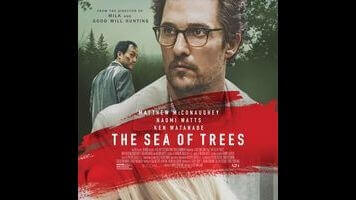The screenplay for The Sea Of Trees, penned by Chris Sparling (Buried), is one of those narrative Rube Goldberg machines where everything falls into place in the unlikeliest, corniest, and worst possible way. Its protagonist is Arthur Brennan (Matthew McConaughey), a science adjunct who buys a one-way ticket to Japan so he can kill himself in Aokigahara, the notorious “suicide forest” at the base of Mount Fuji, only to have his plans upended by Takumi (Ken Watanabe, miscast), a magical salaryman who stumbles out of the bushes with slashed wrists and a bad case of second thoughts. So off they go, the two would-be suicides, trying to find a path out of the dark wood on an odyssey of bad monologues, misguided contrivances, and lengthy flashbacks about Arthur’s alcoholic wife, Joan (Naomi Watts). As it turns out, there is something worse than Nicholas Sparks, the king of morbid romantic kitsch, and that’s a Nicholas Sparks pretender with highfalutin pretensions.
The punchline here is that The Sea Of Trees is directed by Gus Van Sant, a filmmaker who is almost unique in American cinema for moving freely between art films and more mainstream fare. This is Van Sant’s nadir: a sophomoric metaphysical drama that benefits from the director’s pictorial eye (the forest looks fittingly ominous), but succumbs to the sentimentalism that has long been his Achilles’ heel. For a time, the moody palette of earth tones, leafy canopies, and diffused smears created by Van Sant and cinematographer Kasper Tuxen (Beginners) distracts from the hokum, which creeps in slowly, and then turns gangrenous. What starts as a relatable allegory—the man who wants to die, but not like this, forced into survival, scavenging the tents of prior suicides to keep warm—becomes increasingly inane in its treatment of depression and mortality, before a series of twists and false endings, each somehow dumber than the last.
Ghosts are involved—ghosts who are actually other ghosts. So is a brain tumor; a car crash that is incessantly foreshadowed for three solid minutes; a flashback character who the movie hints to have died, only to reveal that they survived to die a completely different way; soliloquies that sound suspiciously like outtakes from McConaughey’s Lincoln commercials, accompanied by weary silent reaction shots from Watanabe; and scenes of troubled home life in which Watts manages to acquit herself very well despite subpar material. As with so much bunk that harps on about the preciousness of life, little seems rooted in lived experience. (At first, one wants to point out that you can’t pass Japanese border control without a return ticket, but this turns out to be least of the film’s problems.) The movie’s idea of New England academia isn’t too far removed from the campus straw men of so-called faith-based entertainment, and the whole conception of Takumi is embarrassing to pick apart.
In some ways, it’s a retread of Van Sant’s slightly more defensible Restless, with which it shares a few plot points, though The Sea Of Trees is less cutesy and more dour. But nothing damns the film more than the fact that it’s dull—and not entrancingly or intentionally dull, in the manner of Gerry and Last Days, Van Sant’s experiments in minimalist formalism, even if the scraggly landscape (and Arthur’s tendency to trip and fall) sometimes recalls the former. No, it’s dull in the way ordinary movies are dull, even if ordinary movies rarely look as good. Those seeking a shitshow to gawk it, be forewarned: It’s a hike. Just take the advice of the signs Arthur ignores, posted on the way into the forest: “Please think again, so that you can make your life a happy one.”

